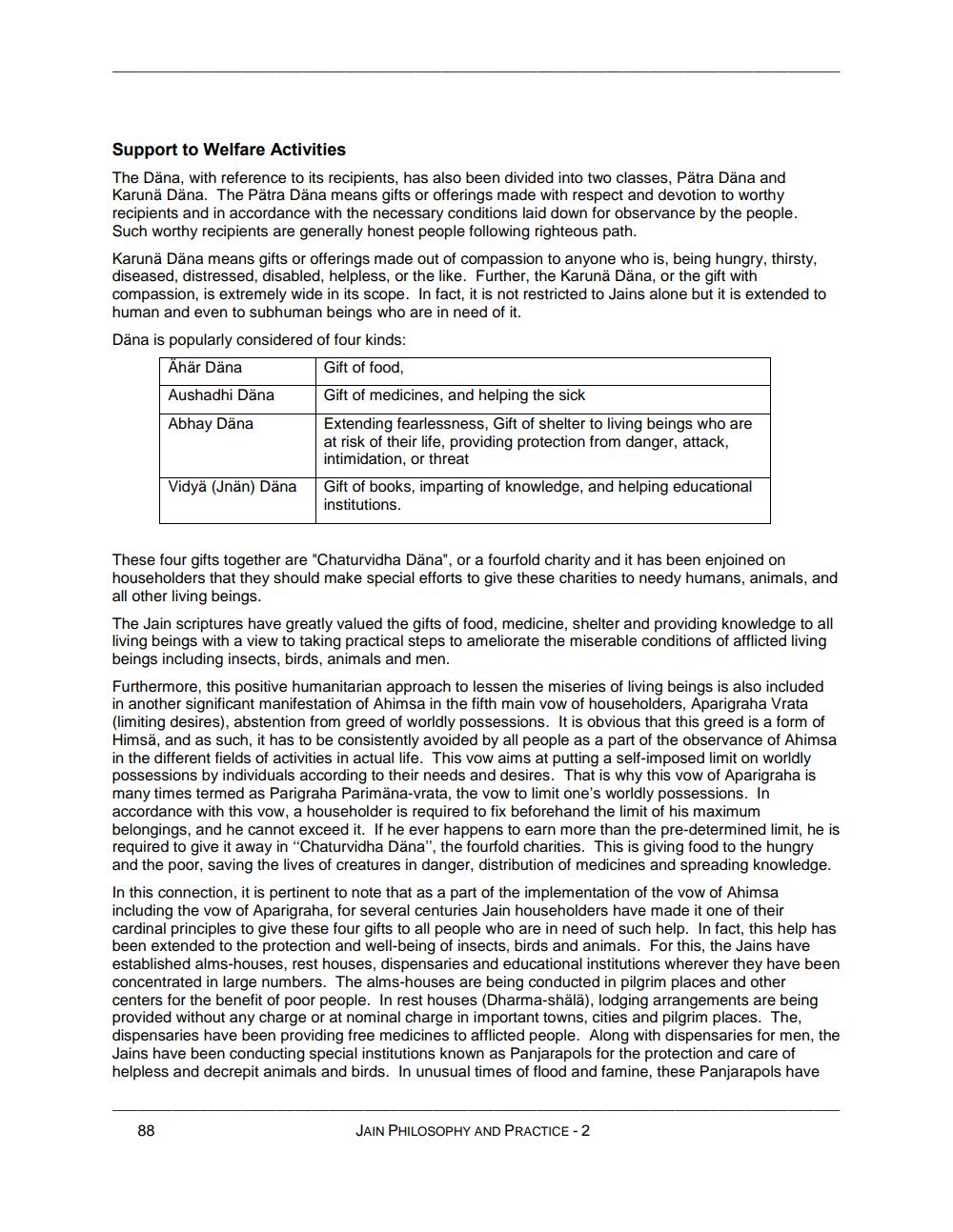________________
Support to Welfare Activities
The Däna, with reference to its recipients, has also been divided into two classes, Pätra Däna and Karunä Däna. The Pätra Däna means gifts or offerings made with respect and devotion to worthy recipients and in accordance with the necessary conditions laid down for observance by the people. Such worthy recipients are generally honest people following righteous path.
Karunä Däna means gifts or offerings made out of compassion to anyone who is, being hungry, thirsty, diseased, distressed, disabled, helpless, or the like. Further, the Karunä Däna, or the gift with compassion, is extremely wide in its scope. In fact, it is not restricted to Jains alone but it is extended to human and even to subhuman beings who are in need of it.
Däna is popularly considered of four kinds:
Ähär Däna
Gift of food,
Gift of medicines, and helping the sick
Extending fearlessness, Gift of shelter to living beings who are at risk of their life, providing protection from danger, attack, intimidation, or threat
Aushadhi Däna Abhay Däna
Vidyä (Jnän) Däna
Gift of books, imparting of knowledge, and helping educational institutions.
These four gifts together are "Chaturvidha Däna", or a fourfold charity and it has been enjoined on householders that they should make special efforts to give these charities to needy humans, animals, and all other living beings.
The Jain scriptures have greatly valued the gifts of food, medicine, shelter and providing knowledge to all living beings with a view to taking practical steps to ameliorate the miserable conditions of afflicted living beings including insects, birds, animals and men.
88
Furthermore, this positive humanitarian approach to lessen the miseries of living beings is also included in another significant manifestation of Ahimsa in the fifth main vow of householders, Aparigraha Vrata (limiting desires), abstention from greed of worldly possessions. It is obvious that this greed is a form of Himsä, and as such, it has to be consistently avoided by all people as a part of the observance of Ahimsa in the different fields of activities in actual life. This vow aims at putting a self-imposed limit on worldly possessions by individuals according to their needs and desires. That is why this vow of Aparigraha is many times termed as Parigraha Parimäna-vrata, the vow to limit one's worldly possessions. In accordance with this vow, a householder is required to fix beforehand the limit of his maximum belongings, and he cannot exceed it. If he ever happens to earn more than the pre-determined limit, he is required to give it away in "Chaturvidha Däna", the fourfold charities. This is giving food to the hungry and the poor, saving the lives of creatures in danger, distribution of medicines and spreading knowledge.
In this connection, it is pertinent to note that as a part of the implementation of the vow of Ahimsa including the vow of Aparigraha, for several centuries Jain householders have made it one of their cardinal principles to give these four gifts to all people who are in need of such help. In fact, this help has been extended to the protection and well-being of insects, birds and animals. For this, the Jains have established alms-houses, rest houses, dispensaries and educational institutions wherever they have been concentrated in large numbers. The alms-houses are being conducted in pilgrim places and other centers for the benefit of poor people. In rest houses (Dharma-shälä), lodging arrangements are being provided without any charge or at nominal charge in important towns, cities and pilgrim places. The, dispensaries have been providing free medicines to afflicted people. Along with dispensaries for men, the Jains have been conducting special institutions known as Panjarapols for the protection and care of helpless and decrepit animals and birds. In unusual times of flood and famine, these Panjarapols have
JAIN PHILOSOPHY AND PRACTICE - 2




